

Aiding Medical Education
In Ethiopia: Connecting with a Medical School, Strengthening a Heritage
When the power goes out at Hawassa University in Ethiopia, medical students sit in a stairwell with generator lights so they can continue studying. Because power outages can be a frequent occurrence in the developing East African nation, the students take this measure in stride.
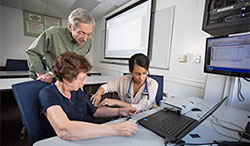
Zenna Solomon works with Drs. Barbara Birshtein and Howard Steinman to test the equipment they brought to EthiopiaTo second-year Einstein medical student Zenna Solomon, who spent six weeks in Ethiopia last summer supported by the Global Health Fellowship Program, the medical students’ solution to the problem demonstrates just how dedicated they are to learning.
“The unique obstacles that they face at Hawassa speak to their resilience,” said Ms. Solomon, whose own parents came to the United States from Ethiopia before she was born.
Ms. Solomon also observed that, despite major differences in infrastructure and resources, both Albert Einstein College of Medicine and Hawassa College of Medicine and Health Sciences attract people with a similar purpose: a strong desire to further their knowledge so that they can help others.
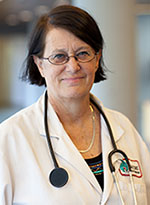
Carol Harris, M.D.This quest is at the heart of Einstein’s relationship with faculty members and students at Hawassa, which dates back to 2002, when Dr. Carol Harris, professor of clinical medicine, first traveled to the sub-Saharan nation at the invitation of Ethiopian healthcare professionals to help establish AIDS awareness, education and programming. During that trip she visited all the major medical schools to teach about AIDS. It also was when she first met members of the Hawassa faculty.
She has since worked with them at their medical school to build an array of programs to enhance faculty development and teaching, and she is working with them to develop a breast cancer program. Ms. Solomon also assisted with the work on the breast cancer unit during her six-week fellowship.
Focusing on Medical Education
The summer of 2015 offered Ms. Solomon an opportunity to immerse herself in the country of her ancestors while helping to lay the foundation for an important teaching upgrade at Hawassa’s new laboratory science building. Working closely with Hawassa faculty members, Drs. Barbara Birshtein and Howard Steinman and Ms. Solomon installed PowerLab instrumentation that will allow Hawassa medical students to use technology not often available in Ethiopia for measuring finger pulses and blood pressure.
“The equipment was something that faculty at Hawassa had identified as an important educational tool,” said Dr. Harris.
Ms. Solomon had used the same equipment as an undergraduate at SUNY Stony Brook. “When Drs. Birshtein and Steinman learned of my experience with the technology, they invited me to help teach the students how to use it,” she said.
Building on a Strong Relationship
Dr. Harris travels to Ethiopia two to four times a year for three- to five-week periods. Her connection to Hawassa College of Medicine and Health Sciences dates back to its beginnings in 2004. Since then, she has invited first- and fourth-year Einstein medical students, along with Einstein faculty members, to assist with various projects. All students receive global health fellowships to support their participation.
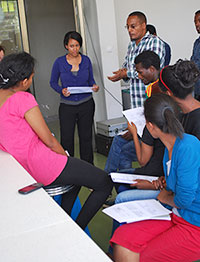
Ms. Solomon leads a training session with Hawassa medical students Among faculty members to make the trip with Dr. Harris and Ms. Solomon were Drs. Birshtein and Steinman, who first traveled to Hawassa in 2013.
“We wanted to give back while we were still vertical,” Dr. Steinman noted, adding that he and Dr. Birshtein—who are husband and wife—had looked into several possibilities that would make use of their teaching skills. Dr. Steinman is assistant dean for biomedical science education and professor of biochemistry, while Dr. Birshtein is professor of cell biology and scientific director of the training and educational grants office.
After spending time at Hawassa and speaking with faculty about needed resources, Drs. Birshtein and Steinman teamed with Dr. Harris and Dr. William Burton, director of the office of educational resources and associate professor of family and social medicine, to apply for a pilot grant from Einstein’s Global Health Center. The funding they received allowed them to bring two PowerLab units, two laptop computers and a router to Hawassa.
They then worked with Ms. Solomon, whose previous experience using the technology helped assure they would know how to properly train the students and faculty at Hawassa on how to use it.
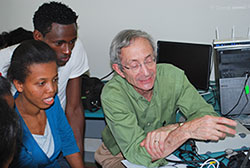
Dr. Steinman demonstrates use of the technology“We encouraged Zenna to oversee the training of the students in how to use the technology,” said Dr. Steinman. “We’ve seen in our own work that students often learn better from one another. This was a setting where it was clear that approach would work well.”
Launching the New Technology
After Hawassa faculty and IT support personnel installed the two functioning PowerLab work stations, the team focused on training the Hawassa instructors who teach the human physiology course and on developing the protocols for scientific experiments.
Ms. Solomon herself led 10 students in a pilot class.
She recalled, “They were able to record their own pulse and see it on a computer screen. They were so excited to get actual data. It was an incredibly rewarding experience.”
Dr. Birshtein added, “Although their resources are modest at best, their human resources are extraordinary. There is something very special about the folks there and we thoroughly enjoyed working with one another.”
Zenna’s Journey
In addition to contributing her technological expertise, Ms. Solomon worked with the head nurse in the breast cancer unit that Dr. Harris helped establish.
Just as her knowledge of the lab equipment helped her teach students, she drew on her past experience as a pharmacy technician and offered to input information that would allow the breast cancer unit staff to manage their chemotherapy stock and project future needs.
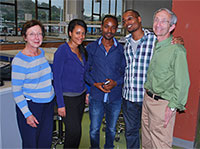
Dr. Birshtein, Zenna Solomon and Dr. Steinman pose with physiology instructors at Hawassa –(from left) Tesfaye Teshome and Tadesse YohannesShe also saw patients. “I was able to follow most interactions between patients and doctors because I can understand some Amharic,” she recalled. Her parents occasionally speak Ethiopia’s primary language at home.
The interactions between the caregivers and their patients made a profound impression.
“When I begin working on the wards next year, that’s something I want to keep in mind,” she added, noting that she now places a higher value on physical diagnosis skills.
A Future Realized
The trip was the beginning of a professional connection Ms. Solomon wants to maintain with her parents’ homeland as she continues her path in medicine.
“It’s motivating to see students going through the same educational experience as I am pursuing a career in medicine while overcoming so much more,” she observed.
She plans to return to Hawassa during fourth year, to assist with other projects that the students and faculty in Hawassa have identified as important to their medical school’s mission and goals.
“I’m excited to return, and hope to make working in Ethiopia a part of my medical career,” she said. She’s off to a great start in achieving her goal.
Posted on: Thursday, March 10, 2016

Tablet Blog